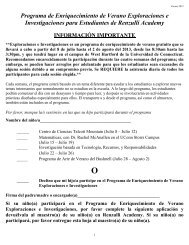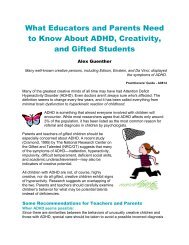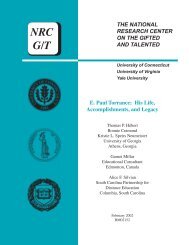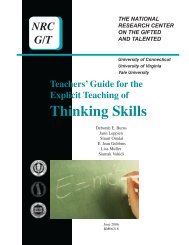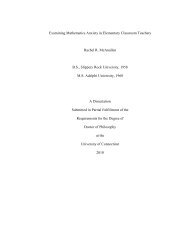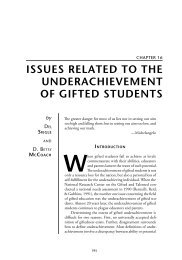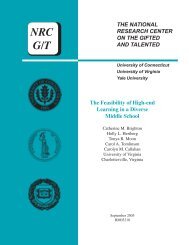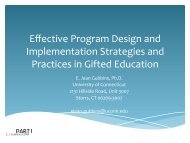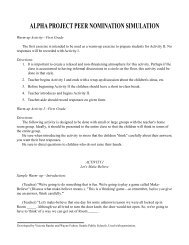Giftedness and High School Dropouts - Neag Center for Gifted ...
Giftedness and High School Dropouts - Neag Center for Gifted ...
Giftedness and High School Dropouts - Neag Center for Gifted ...
Create successful ePaper yourself
Turn your PDF publications into a flip-book with our unique Google optimized e-Paper software.
43<br />
assistance, such as counseling services. There<strong>for</strong>e, it is more appropriate to use a broad<br />
definition of giftedness when studying this population of dropouts.<br />
I was failing school<br />
I got a job<br />
MALE<br />
I couldn't keep up with my school work<br />
I didn't like school<br />
I couldn't work <strong>and</strong> go to school at same<br />
time<br />
FEMALE<br />
I didn't like school<br />
I was pregnant<br />
I became a parent<br />
I was failing school<br />
I had another problem<br />
I couldn't keep up with my schoolwork<br />
Figure 12. Reasons that gifted students drop out of school.<br />
Develop a Prevention Plan<br />
Some prevention programs have been developed <strong>for</strong> dropouts. Grossnickle<br />
(1986) offered five features of a dropout prevention program: awareness, commitment,<br />
coordination, resources, <strong>and</strong> individualized attention <strong>for</strong> at-risk students. Lunenburg<br />
(2000) developed 10 strategies to help school officers in dropout prevention: (a) alter the<br />
instructional environment, (b) establish effective school membership, (c) develop career<br />
academics, (d) develop appropriate <strong>and</strong> supportive school board policies, (e) determine<br />
the students' learning styles, (f) consider community-based collaboration, (g) establish a<br />
case management intervention system, (h) create a mentoring network, (i) establish a<br />
school within a school, <strong>and</strong> (j) use state-legislated negative-sanction policies.<br />
The results from this study suggested that several features should be considered in<br />
a prevention program. First, as early as possible, schools <strong>and</strong> teachers need to identify<br />
gifted students who are at risk of dropping out of school. Second, schools should provide<br />
an appropriate curriculum that addresses gifted students' needs, interests, <strong>and</strong> learning<br />
styles. Third, more opportunities <strong>for</strong> extracurricular activities <strong>and</strong> encouragement to<br />
participate in them should be provided to the gifted students who are at risk of dropping<br />
out. Fourth, as Wells (1989) emphasized, student <strong>and</strong> teacher relationships should be<br />
improved. Previous research as well as results from the present study point out that<br />
negative attitude toward school <strong>and</strong> teachers is a major contributor to dropping out.<br />
Wells reported that a "good teacher" is the most positive element of school. Bhaerman<br />
<strong>and</strong> Kopp (1988) also found that fewer students dropped out of school when their teacher<br />
was flexible, positive, <strong>and</strong> creative. Fifth, counseling services <strong>and</strong> special programs<br />
should be given to gifted students who fail school because of personal or school-related<br />
problems, who are pregnant or have a child, who have a drug problem, <strong>and</strong> who have to<br />
work to support their family. Also, schools <strong>and</strong> teachers should communicate closely<br />
with parents whose gifted child has the potential to drop out of school, <strong>and</strong> parents should




